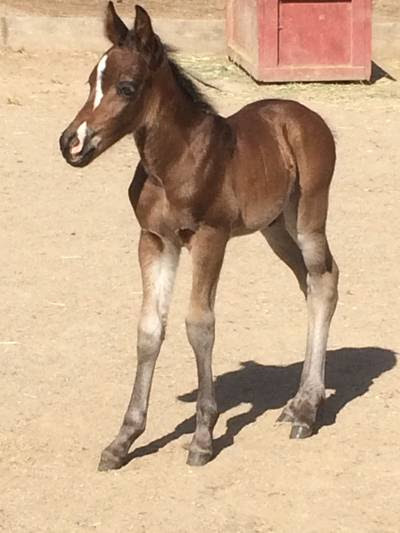We crouched quietly just outside of the stall. The baby, Tavish, dozed peacefully in the straw at
his mother’s feet. Shamrock, aware of our presence, patiently stood over her 3-day-old foal. Her
lower lip hung a bit and her hind hoof was slightly resting…Shamrock was giving us permission
to admire her precious and very tiny colt. To the average bystander, we may have appeared to be
passively watching the new mother and baby, but in fact we were training them both. Even
though the little one dozed, his mother’s acceptance of our presence translated silently to her
foal…a mare will have a very strong impact on her baby’s experience with humans…she must
always be considered and consulted when it comes to her foal.
Shamrock came to us semi-feral, neglected, and seriously malnourished…she was also pregnant.
Every interaction with Shamrock from the moment she arrived at Red Bucket was designed to be
trust building. The great Edward Demming taught us that there is no status quo…neutrality does
not exist, we are either growing or dying…getting a little better or a little worse. While Demming
was more interested in manufacturing processes and continuous improvement, his teachings are
practiced daily at Red Bucket. Every interaction with a horse is a training moment, and as prey
animals, every interaction provides an opportunity to build…or damage…trust.
Trust is often an over-used and ill understood concept. With horses it is far more important to
focus on being trustworthy. The working definition of trust is “past positive experiences”. At Red
Bucket we know that most of our horses have not only not had past positive experiences, they
have had negative, even brutal and terrifying interactions. Our horses have been used to bait dogs
for dog fights, starved, beaten, abused brutally in backyard rodeos, and suffered repeated and
unthinkable abuse. It is ludicrous to assume that horses will trust us. Trust must first be earned,
and it is earned by us putting our energy into being trustworthy…for the horse.
Putting one’s energy into being trustworthy for the horse rather than focusing on whether a horse
trusts us requires one to be intentional, conscious, and present. It also requires us to take
responsibility for every interaction with our equine friends, both in the saddle and on the ground.
When riding, if one abandons a horse at a jump rather than supporting it to the base, hangs on
their mouth with heavy hands rather than softening and supporting from the seat, lands on their
back with a thud of body weight rather than slowly sinking into the saddle, we are eroding trust,
little by little, and we are not being trustworthy for the horse. On the ground, when we use quiet
voices in the barn, approach a horse with awareness, manage our own anxiety,
lead…handle…groom…and touch our horses respectfully and consistently, we build trust. Trust is
like a bank account; we must continue to make regular, albeit small, deposits until the account
has a strong balance. Once there is equity, and we make a mistake, there is enough of a balance
that the one withdrawal can be made without damaging trust. Horses are wonderful in that they
are social, intuitive…and forgiving.
As a lifelong horsewoman and great admirer of everything horse, I am always disheartened to
hear people label a horse. We recently helped a horse that was labeled as a “dirty stopper”. The
horse had started throwing on the brakes regularly in front of fences with long approaches. In
watching the videos that were forwarded to us, requesting us to take a horse that was now also
considered to be “dangerous”, I was disheartened to watch the too-novice rider spur the horse
toward the fence, and then pitch her body forward and drop the horse. In reality, the horse was a
good little egg, she was a pleaser by nature, but had been lied to too many times. She needed her
rider to help her get to the jump safely and with confidence, rather than getting abandoned and
scared. She needed her rider to be trustworthy for her.
At Red Bucket we only label positive behavior; we look for the good and reinforce the positive.
Our horses come to us needing time, a second chance, and the consistent and confident
interactions that are moment by moment. When our horses arrive they receive their very own red
bucket, a name, and a promise that really means something. From the moment that we take the
rope and welcome our new resident to the ranch that the horses own, we also gently vow to be
trustworthy for them.
Trust and being trustworthy
Trust is really about the small things
April 2017 Culture Message


